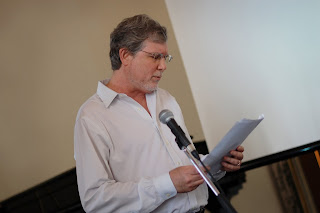Sunday, February 19, 2012 -  2012 ARCA Award nominations,ARCA Awards
2012 ARCA Award nominations,ARCA Awards
 No comments
No comments
 2012 ARCA Award nominations,ARCA Awards
2012 ARCA Award nominations,ARCA Awards
 No comments
No comments
ARCA Announces Nominees for 2012 Awards to be Presented at the International Art Crime Conference in Amelia in June
For the past three years, the Association for Research into Crimes against Art (ARCA) has recognized the professional contributions of four people for the protection of art and cultural property at its International Art Crime Conference in Amelia, the home of the postgraduate certificate program. This month ARCA's Trustees and the Editorial Board of The Journal of Art Crime will again vote for the winners or four awards.
The Award for Art Policing and Recovery (which usually goes to a police officer, investigator, or lawyer). This award has been given to former Director of Scotland Yard's Arts and Antiquities Squad Vernon Rapley (2009), former Scotland Yard investigator Charlie Hill (2010), and former Italian State prosecutor Paolo Giorgio Ferri (2011). The 2012 nominees for the award for Art Policing and Recovering are Don Hyrycyk, Los Angeles Police Department; Alain Lacoursière, founder of Quebec's Art Theft Squad; Sharon Cohen Levin, Chief of the Asset Forfeiture Unit in the United States Attorney's Office for the Southern District of New York; Maurizio Seracini, art historian and scientist searching for Leonardo da Vinci's lost "Battle of the Anghiari" in Florence; and Christos Tsirogiannis, Archaeologist, Illicit antiquities researcher at the University of Cambridge.
The Award for Art Protection and Security (usually goes to a security director or policy-maker); this award has acknowledged the work of former mayor of Rome Francesco Rutelli (2009); Dick Drent, security director of Amsterdam's Van Gogh Museum, (2010); and archaeologist Lord Colin Renfrew (2011). The 2012 nominees for this award are Colonel Mathew Bogdanos, United States Marine Corps Reserves, Senior Investigative Counsel, Assistant District Attorney, New York; Dr. Laurie Rush, manager of the Fort Drum Cultural Resources Program; and (jointly) Karl von Habsburg, President, Association of National Committees of the Blue Shield and Dr. Joris Kila, Chairman, International Military Cultural Resources Work Group.
The Eleanor and Anthony Vallombroso Award for Excellence in Art Crime Scholarship (to a professor or author). Past winners include Norman Palmer (2009); Larry Rothfield (2010); and Neil Brodie (2011). This year's nominees are Jason Felch and Ralph Frammolino for their book, Chasing Aphrodite; Fabio Isman, Journalist Il Messaggero, Italy; Sandy Nairne, Director of the National Portrait Gallery of London and author of Art Theft and the Case of the Stolen Turners.
The Lifetime Achievement in Defense of Art Award (given to an individual or institution in recognition of many decades of excellence in the field) has been conferred to the Carabinieri Division for the Protection of Cultural Heritage collectively (2009); attorney Howard Spiegler (2010); and cultural property expert John Henry Merryman (2011). This year's nominees are Dr. George Okello Abungu; Colonel Mathew Bogdanos; Mark Dalrymple, Managing Director of Loss Adjuster at Tyler & Co. (Adjusters) Ltd.; Sandy Nairne; and Maurizio Seracini.
The awards will be presented to the winners at the International Art Crime Conference on June 23 and 24 in Amelia, Umbria, Italy.
The awards will be presented to the winners at the International Art Crime Conference on June 23 and 24 in Amelia, Umbria, Italy.








